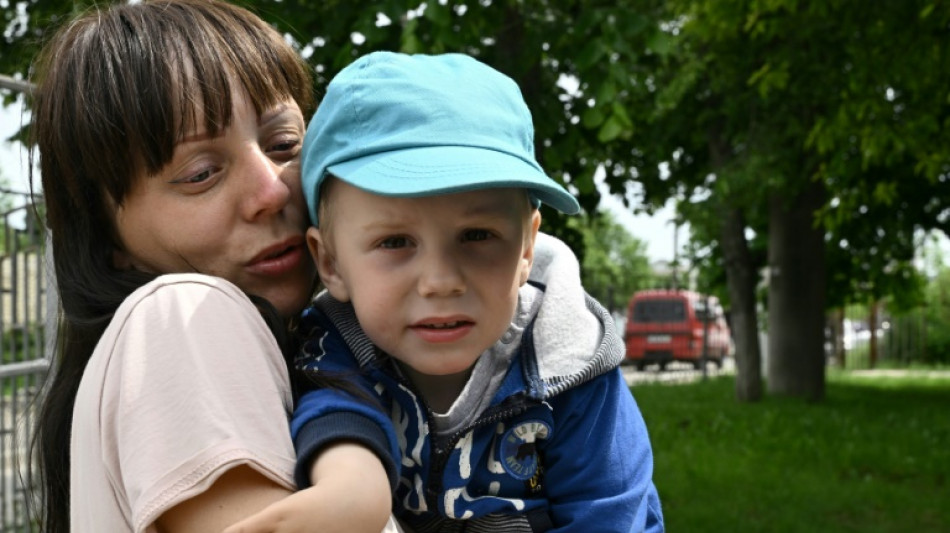
-
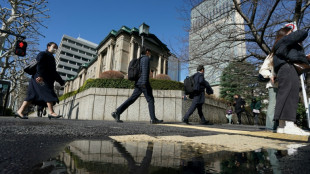 US stocks rise on Meta, Microsoft ahead of key labor data
US stocks rise on Meta, Microsoft ahead of key labor data
-
Toulouse injuries mount as Ramos doubtful for Champions Cup semi

-
 Guardiola glad of Rodri return but uncertain if he'll play in FA Cup final
Guardiola glad of Rodri return but uncertain if he'll play in FA Cup final
-
Ruud sails past Medvedev into Madrid Open semis
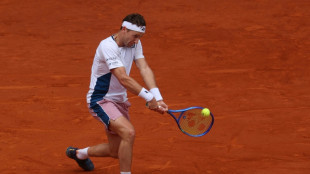
-
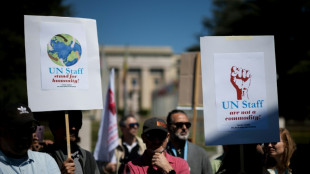 'Not a commodity': UN staff rally over deep cuts
'Not a commodity': UN staff rally over deep cuts
-
Flintoff proud as Afghan refugee protege plays for Lancashire second team

-
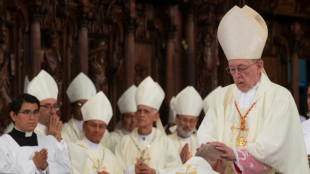 Peruvian cardinal accused of abuse challenges late pope's sanction
Peruvian cardinal accused of abuse challenges late pope's sanction
-
Trans women barred from women's football by English, Scottish FAs

-
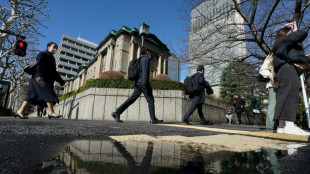 Oil prices drop, stocks diverge amid economic growth fears
Oil prices drop, stocks diverge amid economic growth fears
-
Israel brings fire near Jerusalem 'under control', reopens roads
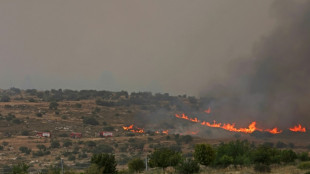
-
 Lopetegui appointed coach of Qatar
Lopetegui appointed coach of Qatar
-
UK counter-terrorism unit probes rappers Kneecap but music stars back band

-
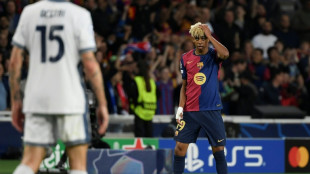 Yamal heroics preserve Barca Champions League final dream
Yamal heroics preserve Barca Champions League final dream
-
2026 T20 World Cup 'biggest women's cricket event in England' - ECB
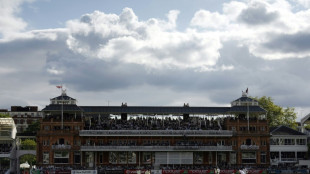
-
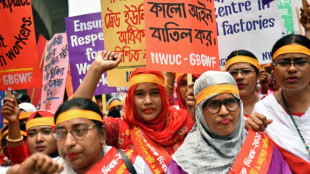 Bangladesh begins three days of mass political rallies
Bangladesh begins three days of mass political rallies
-
Children learn emergency drills as Kashmir tensions rise
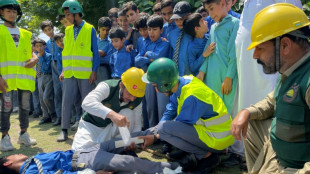
-
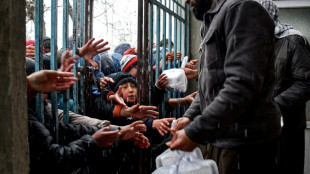 Millions of children to suffer from Trump aid cuts
Millions of children to suffer from Trump aid cuts
-
Veteran Wallaby Beale set for long-awaited injury return
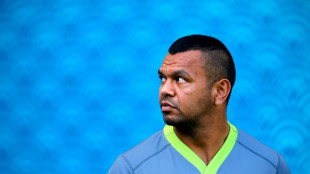
-
 Syria's Druze take up arms to defend their town against Islamists
Syria's Druze take up arms to defend their town against Islamists
-
Tesla sales plunge further in France, down 59% in April

-
 US calls on India and Pakistan to 'de-escalate'
US calls on India and Pakistan to 'de-escalate'
-
Israel reopens key roads as firefighters battle blaze

-
 Europe far-right surge masks divisions
Europe far-right surge masks divisions
-
James will mull NBA future after Lakers playoff exit

-
 Ukraine's chief rabbi sings plea to Trump to side with Kyiv
Ukraine's chief rabbi sings plea to Trump to side with Kyiv
-
Australian mushroom meal victim 'hunched' in pain, court hears

-
 Lakers dumped out of playoffs by Wolves, Rockets rout Warriors
Lakers dumped out of playoffs by Wolves, Rockets rout Warriors
-
Booming tourism and climate change threaten Albania's coast

-
 US reaching out to China for tariff talks: Beijing state media
US reaching out to China for tariff talks: Beijing state media
-
Tariffs prompt Bank of Japan to lower growth forecasts

-
 Kiss faces little time to set Wallabies on path to home World Cup glory
Kiss faces little time to set Wallabies on path to home World Cup glory
-
Serbian students, unions join forces for anti-corruption protest

-
 Slow and easily beaten -- Messi's Miami project risks global embarrassment
Slow and easily beaten -- Messi's Miami project risks global embarrassment
-
Fan in hospital after falling to field at Pirates game

-
 Nuclear power sparks Australian election battle
Nuclear power sparks Australian election battle
-
Tokyo stocks rise as BoJ holds rates steady

-
 Bank of Japan holds rates, lowers growth forecasts
Bank of Japan holds rates, lowers growth forecasts
-
'Sleeping giants' Bordeaux-Begles awaken before Champions Cup semis

-
 Napoli eye Scudetto as Inter hope for post-Barca bounce-back
Napoli eye Scudetto as Inter hope for post-Barca bounce-back
-
Germany's 'absolutely insane' second tier rivalling Europe's best

-
 PSG minds on Arsenal return as French clubs scrap for Champions League places
PSG minds on Arsenal return as French clubs scrap for Champions League places
-
UK WWII veteran remembers joy of war's end, 80 years on

-
 Myanmar junta lets post-quake truce expire
Myanmar junta lets post-quake truce expire
-
Rockets romp past Warriors to extend NBA playoff series

-
 Messi, Inter Miami CONCACAF Cup dream over as Vancouver advance
Messi, Inter Miami CONCACAF Cup dream over as Vancouver advance
-
UN body warns over Trump's deep-sea mining order

-
 UK local elections test big two parties
UK local elections test big two parties
-
US judge says Apple defied order in App Store case

-
 Seventeen years later, Brood XIV cicadas emerge in US
Seventeen years later, Brood XIV cicadas emerge in US
-
Scorching 1,500m return for Olympic great Ledecky in Florida


'I can breathe': Ukraine women and children flee Russian troops
The hordes of exhausted people hurrying through the east Ukraine checkpoint towards Red Cross buses were women, children and the elderly, desperate to flee the horrors of life in Russian-controlled territory.
They were crying or had lined faces and harrowed eyes, a testimony to the living hell they had endured in east Ukraine after Russia's invasion in late February.
"I can breathe more easily now," Anna, a teacher who fled with her children aged 13 and 11, told AFP, declining to give her surname as she crossed the checkpoint.
But she was grieving for what she left behind. As part of the deal with Russian forces to let Ukrainians out, men under 60 were obliged to remain behind -- including Anna's husband.
"It was the only solution with the children," she said, wiping her tears.
A steady flow of mini buses and cars delivered some 1,350 people and their luggage on Monday to land held by Ukrainian forces.
The convoy, carrying children with soft toys and women saddled with luggage, crossed a dam cutting through a reservoir that serves as the demarcation line between Russian and Ukrainian troops.
- Grim 'Russian world' -
The evacuees recounted horrifying stories of life under Russian occupation. The women were hesitant to give their full names, fearing their husbands could be punished for their testimony.
Oksana said she was "relieved" to have escaped. She brought with her two dogs "who are part of the family," but her husband was left behind.
"There were explosions all along the road. We couldn't get away," she said, explaining that she was at her countryside holiday cottage when the war erupted.
"Then the Russian tanks with the Z-symbols came through," she said, referring to a symbol Russia uses for what it calls a special military operation in Ukraine.
Their arrival, she said, meant she was unable to return to her home in Kharkiv, Ukraine's second-largest city, which was shelled incessantly but fended off Russian efforts to capture it.
Tetyana, a 19-year-old student said she was happy to back in her "native Ukraine" after three months of living in "the Russian world".
The term, often repeated by Russian President Vladimir Putin, is used to refer to regions the Kremlin believes fall under sphere its of influence.
In this "Russian world", "we didn't go out into the streets to avoid meeting" the soldiers, said Viktoria, Anna's colleague and mother of children aged 12 and 9, who also left her husband behind.
The two teachers said they had continued to teach remotely.
The new arrivals said Russian authorities had confiscated telephones and that residents there only felt safe using them in the privacy of their homes.
Internet and electricity had been cut for the nine days prior to their departure to the Ukrainian side.
They said they were unable to withdraw cash and that towns and cities under Russia's grip desperately need food and humanitarian aid.
- 'War crimes' -
Another evacuee named Anna, a two-year-old baby in her arms, had trouble consoling herself.
"One moment it was calm, but then explosions started. We had to leave with my son," she said.
She was worried about her husband who stayed.
The family had realised the war had started when it heard explosions and saw Russian trucks in the street.
"We spent two days in the school basement,"she said.
"We did not know on whose territory we were, but then the Russians arrived and set up checkpoints."
Anna said she will stay with relatives and hopes to see her husband soon.
"I hope all is well (with him). It was very difficult to leave."
Local prosecutor Eduard Mirgorodsky said people were "traumatised and scared."
He is interviewing displaced people to see if war crimes were committed.
"There is a lot of talk about kidnappings, robberies and also collaboration with the enemy," he said.
He also said that many who wanted to leave could not be evacuated and remained blocked on the other side.
"Many, many people stayed," sighed 46-year-old Red Cross volunteer Igor Klymenko.
He stressed that humanitarian aid was also needed there: "Help is needed!"
H.E.Young--AMWN